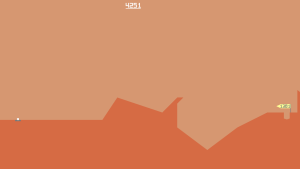

Desert Golfing is a simple 2D drag and release golf simulator. The terrain is procedurally generated and the play consists of pulling your thumb on the screen to indicate the force and direction that you will launch your ball in. That’s it. Just endless orange dunes and hole after hole. It keeps track of the total number of strokes you have taken and submits your score to the Game Center after a thousand holes. You will occasionally see a cactus or a rock. There is no celebration if you get a hole in one, and there is no reward besides another hole.
“I have realized that the past and future are real illusions, that they exist in the present, which is what there is and all there is.”
– Alan Watts
In Desert Golfing there is only the hole of golf that you are on. There is a hole coming up, and one you just completed, but they are meaningless in the context of the immediate game you are playing. There is some form of connection to the past via your score and the fact that the holes are numbered, but even that doesn’t really matter much in the course of play. The hole you are on doesn’t much matter, it is just this one shot in this one moment. No fanfare, no special treatment, just a continuous offering of the experience itself.
“If you’re doing poorly, the temptation to hit the reset button would always be lurking over you. But with no way to restart, the player feels a sense of freedom and reconciliation with life’s past mistakes.”
– Justin Smith, designer of Desert Golf
There are no menus and no restarting the game short of deleting it from your device and reinstalling it. There is just the game. No explanation needed or given. You gradually get better at playing it, but even then you are at the mercy of the terrain generator. Some holes are straight shots, some complicated negotiations trying to get on top of a tiny table-top or over a giant hill. The fact that the game seemingly doesn’t care for or about you is dramatically liberating. It leaves you the freedom to just play.
